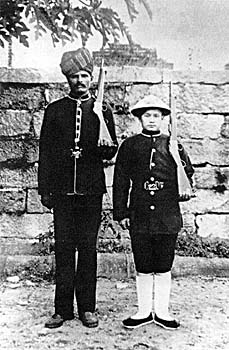Looking back - Recruits for a new force
 On guard: An Indian and a Chinese constable in 1900 |
This is the first in a series of articles looking back on the Force's history through excerpts taken from a recent issue of the Royal Hong Kong Police Association Newsletter. Enjoy!
- The Contingent Input into the Hong Kong Police Force
Following the formal occupation of Hong Kong by the British in 1841 the Police Force, functioning under William Caine and William Pedder, the Principal and Marine Magistrates respectively, relied mainly on soldiers and sailors recruited locally to form its rank and file.
Many of them had been discharged from service life due to ill health or disciplinary problems, but they were all that was available to the Government of the day struggling as it was to secure its rather precarious hold on the newly-occupied territory.
Records show soldiers enlisting in the police, at least initially, retained their service ranks. These men were taken on strength piecemeal, and went on duty without the benefit of any formal training and with virtually no knowledge of any Chinese dialects spoken by the populace they were supposed to protect and police.
In 1843 the policing was in such dire straits there were reported to be 28 police constables and some 44 Justices of the Peace, an early eastern example of the Chiefs and Indians syndrome.
The demand for an effective force was exacerbated by the economic boom experienced following the Treaty of Hong Kong by which the island was ceded to Britain and the first five of many Treaty Ports opened for trade. The problem was to some means addressed by the recruitment in March 1844 of some 60 soldiers from Her Majesty's 98th Regiment (in Hong Kong following operations on the China coast during the First China War).
A fair proportion of these men had originated in Her Majesty's 55th Regiment but, this Regiment having left China for India, they were obliged to undergo a temporary and short-lived transfer prior to their enlistment into the Police. This was the first of many examples of contingent recruitment into the Force, and these articles take a short chronological glimpse at successive examples.
The Hong Kong Police Force was formally established by Ordinance No.12 of 1844. It then consisted of a small number of European Officers, European Non-Commissioned Officers (NCOs) and European Constables supported by Indian NCOs and Constables.
In 1845 three officers from the Metropolitan Police Force, Charles May, Hugh McGregor and Thomas Smithers, were recruited to put the Force on a professional footing. McGregor fell out with Government and Smithers drowned, but May survived to become the first Captain Superintendent (Head of Police), in which he served for 17 years followed by a further 17 as Police Magistrate.
There were initially no Chinese Constables, although by 1856 Force strength had risen to 238 and about that time the Force comprised a virtual United Nations with Caucasians of every stripe (although the majority remained British), Hindus, Sikhs, Moslems, West Indians, Malays, Manilamen, Malacca and Bombaymen.
By 1867 the overall strength had risen to some 90 Europeans, 370 Indians and 130 Chinese.
The ethnic ratios remained more or less constant until the end of the century when eventually the Chinese element exceeded the Indian. The year 1872 saw the recruitment from Scotland of some 45 men. Most of these came from the Edinburgh City Police Force although the gravestones of those who died in Hong Kong show places of birth as diverse as the Shetlands and the Outer Hebrides. These men became known as the Scotch (sic) Contingent.
The following year, in response to much local pressure for a continued expansion of the Force, and also to make good the very high wastage rate due to continuing disciplinary and health problems, a further contingent of 20 men were recruited from the Metropolitan Police Force, and were known as the London Contingent.
For the next 30 years there were no major influxes into the Force, the rapid expansion of the 1870s and local induction, again of former soldiers and sailors, and increasingly of Chinese, coupled with improved training, equipment and conditions of service as well as far better standards of health and hygiene, had enabled the agreed establishment to be maintained.
<< Back to Index >>